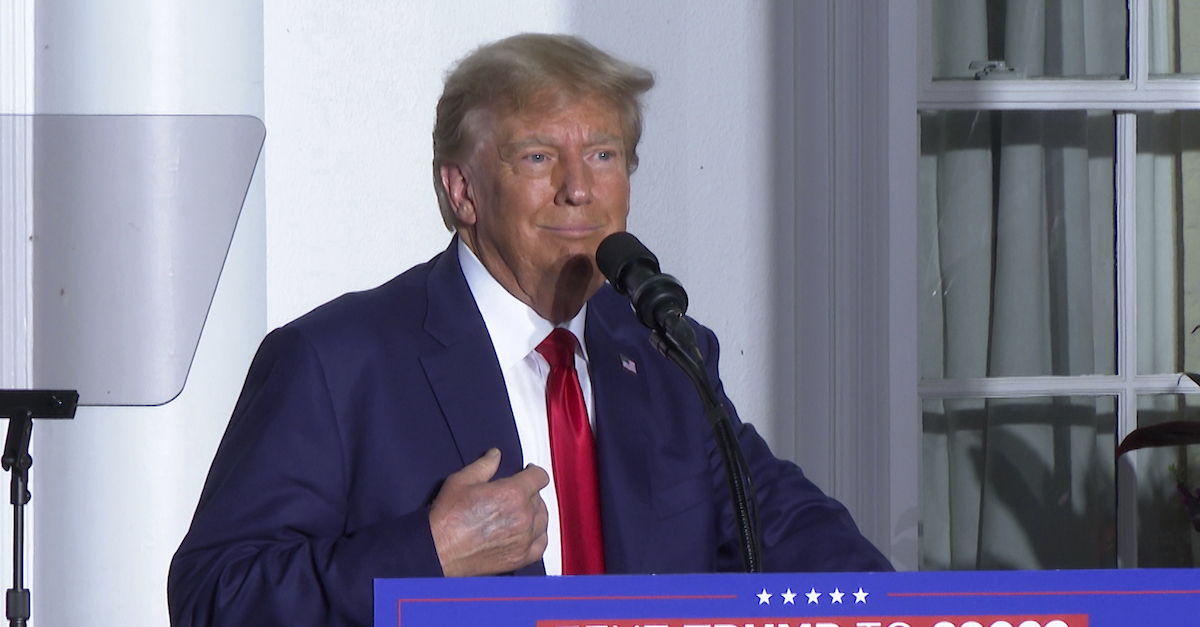
Former U.S. President Donald Trump speaks at his Trump National Golf Club Bedminster on Tuesday, June 13, 2023, in Bedminster, New Jersey. Trump spoke at the golf club after he pleaded not guilty to federal charges alleging he hoarded classified documents detailing sensitive military secrets and schemed to thwart government efforts to get them back. (AP Photo/Ted Shaffrey)
An ex-intelligence analyst for the FBI in Kansas who pleaded guilty to two counts of violating 18 U.S.C. § 793(e), the same charged offense former President Donald Trump faces in his Mar-a-Lago federal prosecution, was sentenced Wednesday to nearly four years in prison.
This development in the case of Kendra Kingsbury, 50, is not good news for Trump, particularly if he does not abandon the throw-it-at-the-wall-and-see-if-it-sticks strategy he’s deployed since his indictment in Florida. The on-point Kingsbury case shows that the former president faces the real prospect of going to prison if convicted of these Espionage Act charges (and there are 31 of those counts in his case).
According to Kinsbury’s indictment, the veteran FBI intelligence analyst who worked for the agency from 2004 to late 2017 — and possessed a “TOP SECRET//SCI security clearance” with access to national defense and classified information —”improperly removed and unlawfully and willfully retained, in her personal residence, sensitive government materials, including National Defense Information” and “approximately 386 classified documents.”
“Beginning at a time unknown, but no earlier than in or about June 2004, and continuing through on or about December 15, 2017, the defendant improperly removed and unlawfully and willfully retained, in her personal residence, sensitive government materials, including National Defense Information and classified documents. The defendant was not authorized to remove and retain these sensitive government materials, including the National Defense Information and classified documents,” the government said. “Nor did the defendant have a ‘need to know’ most, if not all, of the information contained in those materials, including the National Defense Information and classified documents. The defendant knew that she was not authorized to remove and retain the materials, including the National Defense Information and classified documents.”
The feds said that one of their own unlawfully retained classified “SECRET level” materials that: “[D]escribe intelligence sources and methods related to U.S. government efforts to defend against counterterrorism, counterintelligence, and cyber threats”; include “details on the FBI’s nationwide objectives and priorities” and on “specific open investigations across multiple field offices”; and that relate to “sensitive human source operations in national security investigations, intelligence gaps regarding hostile foreign intelligence services and terrorist organizations, and the technical capabilities of the FBI against counterintelligence and counterterrorism targets.”
Kingsbury was specifically accused of (and admitted to) willfully retaining “[n]umerous documents classified at the SECRET level from the OGA that describe intelligence sources and methods related to U.S. government efforts to collect intelligence on terrorist groups,” including al Qaeda.
“The documents include information about al Qaeda members on the African continent, including a suspected associate of Usama bin Laden,” the indictment said. “In addition, there are documents regarding the activities of emerging terrorists and their efforts to establish themselves in support of al Qaeda in Africa.”
Special Counsel Jack Smith has similarly accused Trump of storing classified documents in boxes at Mar-a-Lago that contained “information regarding defense and weapons capabilities of both the United States and foreign countries; United States nuclear programs; potential vulnerabilities of the United States and its allies to military attack; and plans for possible retaliation in response to a foreign attack,” documents which, if disclosed, “could put at risk the national security of the United States, foreign relations, the safety of the United States military, and human sources and the continued viability of sensitive intelligence collection methods.”
Some of the documents in Kingsbury’s possession were store hard drives and CDs, the feds said. Notably, the U.S. Attorney’s Office for the Western District of Missouri said it still isn’t entirely clear what Kingsbury used the classified documents for.
Read Related Also: ‘Obsession with race’ that ‘belies reality’: Sotomayor and Jackson slam Thomas for equating affirmative action with slavery and Jim Crow
“Investigators reviewed Kingsbury’s telephone records, which revealed a number of suspicious calls. Kingsbury contacted phone numbers associated with subjects of counterterrorism investigations, and these individuals also made telephone calls to Kingsbury. Investigators have not been able to determine why Kingsbury contacted these individuals, or why these individuals contacted her. Kingsbury declined to provide the government with any further information,” a press release said.
The government’s sentencing memorandum said that Kingsbury denied making or receiving the suspicious calls to counterterrorism subjects and “denied having the home telephone number” associated with those calls.
In the defense memo, Kingsbury’s federal defender sought a punishment of probation, arguing that “serious medical issues” and family tragedies played a role in the crimes.
“If her own extensive medical issues were not enough to endure during this time, she also experienced several traumatic family events. Her stepbrother died in September 2006, followed by her stepfather in November 2011. An uncle was murdered in south Texas in June 2015. And her mother suffered a heart attack and heart surgery in June 2016. Then, in September 2016, her father passed unexpectedly while away from home. Finally, in June 2017, her father-in-law passed away, punctuating years of loss in Ms. Kingsbury’s family,” the defense memo said. “These things not only resulted in physical and mental struggles for Ms. Kingsbury, but also caused her difficulties with her work. Through it all, she was forced to miss work, but still required to keep up with her job responsibilities. The persistent medical and familial struggles that Ms. Kingsbury endured throughout her tenure with the FBI are key to understanding why this offense occurred.”
On Oct. 13, 2022, Kingsbury pleaded guilty in U.S. District Judge Stephen R. Bough’s courtroom to violating two counts of 18 U.S.C. § 793(e). On Wednesday, the same judge ordered her to spend 46 months in federal prison (3 years and 10 months).
“I cannot fathom why you would jeopardize our nation by leaving these types of documents in your bathtub,” the judge reportedly said.
The former president is also accused of storing boxes full of docs in a Mar-a-Lago bathroom, among other places:

Have a tip we should know? [email protected]








